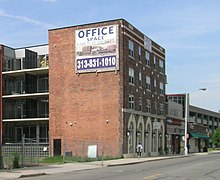Sugar Hill Historic District (Detroit): Difference between revisions
Grovermaker (talk | contribs) |
|||
| Line 27: | Line 27: | ||
== History == |
== History == |
||
[[Image:SugarHill2.jpg|thumb|left|An apartment on Garfield]] |
[[Image:SugarHill2.jpg|thumb|left|An apartment on Garfield]] |
||
Starting in the 1940s, urban renewal in Detroit forced the African-American community living near downtown to move northward.<ref name = "dhc">[http://www.ci.detroit.mi.us/legislative/boardscommissions/historicdesignationboard/Newsletters/newswinter6-2.pdf ''The Foundation,'' Quarterly Newsletter of the Detroit Historic Commission], Winter 2003</ref> The area east of Woodward where the [[Detroit Medical Center]] now stands became the center of the entertainment district. The beautiful building shown in the first photo on the left stood on the south side of Garfield between Woodward and John R. but was torched and demolished in the summer of 2008 either by squatters upset that the neighborhood would soon be revitalized, or as an insurance scam by the owners of the building, as is often the case in the city. An art gallery is purported to be opening on Forest |
Starting in the 1940s, urban renewal in Detroit forced the African-American community living near downtown to move northward.<ref name = "dhc">[http://www.ci.detroit.mi.us/legislative/boardscommissions/historicdesignationboard/Newsletters/newswinter6-2.pdf ''The Foundation,'' Quarterly Newsletter of the Detroit Historic Commission], Winter 2003</ref> The area east of Woodward where the [[Detroit Medical Center]] now stands became the center of the entertainment district. The beautiful building shown in the first photo on the left stood on the south side of Garfield between Woodward and John R. but was torched and demolished in the summer of 2008 either by squatters upset that the neighborhood would soon be revitalized, or as an insurance scam by the owners of the building, as is often the case in the city. An art gallery is purported to be opening on Forest Ave. and one of the dilapidated historic properties on Canfield was recently resurrected as luxury loft condos and office space. Currently, the only occupied buildings on Garfield are the Lofts, The MOCAD and the Garfield Estate on the east end.<ref name = "dhc"/> |
||
The [[Edwin S. George Building|Garfield Building]] stands at the corner of Woodward and Garfield in the center of the district, as does the [[Museum of Contemporary Art Detroit]]. |
The [[Edwin S. George Building|Garfield Building]] stands at the corner of Woodward and Garfield in the center of the district, as does the [[Museum of Contemporary Art Detroit]]. |
||
Revision as of 06:36, 23 January 2009
Sugar Hill Historic District | |
 Garfield Street, looking east from Woodward. The building to the left is the Garfield Building; the DMC is in the background. | |
| Location | Detroit, Michigan |
|---|---|
| Built | 1946 |
| Architect | Cooper, T.W., |
| Architectural style | Beaux Arts, Early Commercial |
| NRHP reference No. | 03000068[1] |
| Added to NRHP | March 03, 2003 |
The Sugar Hill Historic District is a historic district in Detroit, Michigan. It is located along three streets: East Forest, Garfield, and East Canfield, between Woodward Avenue on the west and John R. on the east.
History

Starting in the 1940s, urban renewal in Detroit forced the African-American community living near downtown to move northward.[2] The area east of Woodward where the Detroit Medical Center now stands became the center of the entertainment district. The beautiful building shown in the first photo on the left stood on the south side of Garfield between Woodward and John R. but was torched and demolished in the summer of 2008 either by squatters upset that the neighborhood would soon be revitalized, or as an insurance scam by the owners of the building, as is often the case in the city. An art gallery is purported to be opening on Forest Ave. and one of the dilapidated historic properties on Canfield was recently resurrected as luxury loft condos and office space. Currently, the only occupied buildings on Garfield are the Lofts, The MOCAD and the Garfield Estate on the east end.[2]
The Garfield Building stands at the corner of Woodward and Garfield in the center of the district, as does the Museum of Contemporary Art Detroit.
References

- ^ "National Register Information System". National Register of Historic Places. National Park Service. 2008-04-15.
- ^ a b The Foundation, Quarterly Newsletter of the Detroit Historic Commission, Winter 2003



